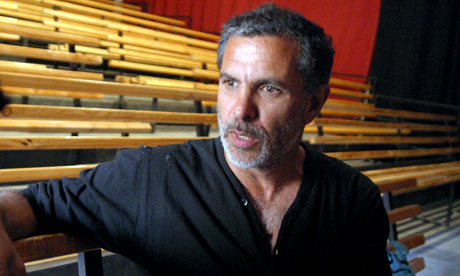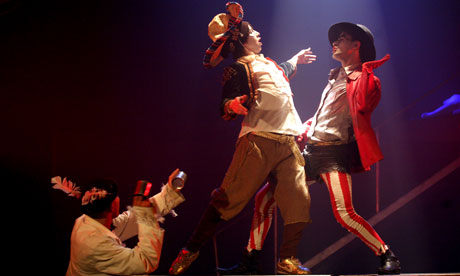Palestinian-Israeli Actor Activist – Director of Freedom Theatre
Juliano Mer-Khamis
Palestinian-Israeli actor, activist and theatre director with a global reputation

The Palestinian-Israeli actor Juliano Mer-Khamis, who has been shot dead at the age of 52, was a successful stage and screen performer, film-maker and activist, widely known for his work as the artistic director of the Freedom theatre in the refugee camp in the West Bank town of Jenin. Dedicated to equipping young Palestinians with the potent powers of art and self-expression, Juliano carved out a stage on which children could find their feet – and voice. The theatre’s achievements have resonated around the world as a focal point of creativity against the odds.
In Israel, Juliano was a stage and television star. He was known abroad as a film actor, making his debut in the 1984 adaptation of John le Carré’s The Little Drummer Girl, starring Diane Keaton, and his last role was in Julian Schnabel’s Miral (2010), based on Rula Jebreal’s autobiographical account of growing up as an orphaned Palestinian girl.
I first met Juliano – “Jule” – at the opening of the Freedom theatre in 2006. Then and many times subsequently, he spoke of building an autonomous space – both emotional and physical – for the children of the Jenin camp, traumatised by Israeli attacks and the occupation. Jenin was known as Israel’s “terror capital” during the second intifada, or uprising, starting in 2000, because of the number of suicide bombers that came from the camp, and in April 2002 it was the site of fierce sustained conflict. Juliano said that the third Palestinian intifada should be cultural, with “poetry, music, theatre, cameras and magazines”.
 The Freedom theatre’s daring adaptation of Lewis Carroll’s Alice in Wonderland brought criticism from sectors of Palestinian society. Photograph: Saif Dahlah/AFP/ Getty ImagesThe Freedom theatre was a community project that evolved to include art exhibitions, drama therapy, film-making courses and a computer room. Currently in the middle of an expansion plan, the theatre has staged provocative plays, using drama to challenge power, corruption, conservatism and traditionalism.
The Freedom theatre’s daring adaptation of Lewis Carroll’s Alice in Wonderland brought criticism from sectors of Palestinian society. Photograph: Saif Dahlah/AFP/ Getty ImagesThe Freedom theatre was a community project that evolved to include art exhibitions, drama therapy, film-making courses and a computer room. Currently in the middle of an expansion plan, the theatre has staged provocative plays, using drama to challenge power, corruption, conservatism and traditionalism.
A recent daring adaptation of Lewis Carroll’s Alice in Wonderland brought criticism from sectors of Palestinian society. There were arson attempts on the theatre in 2009, over a production of Animal Farm that took George Orwell’s satire of the corruption of socialist ideas and spun it into a critique of Palestinian politics. At the time, Juliano spoke of receiving death threats.
He was not a readily acceptable character in mainstream Israeli society – as an advocate of a bi-national state, he did not sugar-coat his views on the politics of the conflict.
The Freedom theatre continues the work of his mother, Arna Mer, who founded a children’s drama therapy and education project at the camp during the 1980s. Juliano, by then an established actor, often helped his mother. As chronicled in the documentary Arna’s Children (2004), which he directed, he returned to the camp in 2002, seven years after her death. The recent battles between the Israeli army and Palestinian fighters had reduced the Jenin camp to rubble – and razed Arna’s theatre to the ground.
The actor sought out the children taught by his mother, and found that several had become militants and had been killed. Another, Zakaria Zubeida, was the military leader of the al-Aqsa Martyrs Brigade, but later put violence aside and joined the Freedom theatre.
Juliano was born in Nazareth: Arna was Jewish, and his father, Saliba Khamis, was a Christian Palestinian. Arna was in the Palmach, the armed wing of the Haganah, the Zionist resistance movement that operated in British mandate Palestine before Israel’s creation in 1948. During the 1950s she became a committed member of the Israeli Communist party, which advocated bi-national democracy, and there she met Saliba, one of its leaders. Juliano spoke of the “racial lunacy” into which he was born – he said that his mother nearly bled to death when she gave birth to him in an Israeli hospital, because doctors knew of her Palestinian husband and refused to treat her.
When Juliano served in the Israeli army as a paratrooper, Saliba refused to speak to him for a year. Later, Juliano refused an order, went to prison and was dismissed. He came to describe himself as “100% Palestinian and 100% Jewish”.
Juliano was killed by a masked gunman outside the Freedom theatre – an end he had predicted three years ago on Israeli television. He is survived by his wife, Jenny, who is expecting twins; by their son, Jay; and by his daughter Milay and stepdaughter Keshet, both from an earlier relationship.
• Juliano Mer-Khamis, actor, film-maker, theatre director and activist, born 29 May 1958; died 4 April 2011



